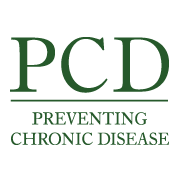PCD News Summary for February 9, 2017

About the Journal
Published every Thursday, Preventing Chronic Disease (PCD) is a peer-reviewed online journal established by CDC’s National Center for Chronic Disease Prevention and Health Promotion. The News Media Branch prepares press summary packets each week. To receive these press summaries on an embargoed basis, send an e-mail to media@cdc.gov. Please note that this e-mail list is for credentialed journalists only. All others, please visit Hookup to Health to sign up for e-mail updates
Notice to News Media - PCD Release Time and Embargo Policy:
CDC’s News Media Branch releases to reporters the PCD media packet every Tuesday afternoon between 12 and 2 pm.
Embargoed until Thursday, February 9, at 12:00 PM ET
An Initiative to Facilitate Park Usage, Discovery, and Physical Activity Among Children and Adolescents in Greenville County, South Carolina, 2014
Melissa Newton
mnewton@cdc.gov
404-718-6281
An incentivized scavenger-hunt-style program designed to increase young people’s park use may help them get more physical activity. Park Hop is a summer-long scavenger hunt designed to increase park use, park discovery, and physical activity. Researchers evaluated the Park Hop program in South Carolina using multiple measures such as pre- and post-intervention participant surveys and in-park observations. They concluded that the program positively influenced park usage, park discovery, participants’ perceptions of parks, and time engaged in physical activity. Children and adolescents visited an average of 12.1 (of 19) Park Hop parks and discovered an average of 4.6 venues. Researchers note that this valuable community-based initiative is easily replicable and can be implemented in other communities looking to increase physical activity in local park settings.
Randomized Controlled Trial of a Community Health Worker Self-Management Support Intervention Among Low-Income Adults With Diabetes, Seattle, Washington, 2010–2014
Melissa Newton
mnewton@cdc.gov
404-718-6281
In-home diabetes self-management support from community health workers could improve the glycemic control of people with severe hyperglycemia, even among patients who frequently participated in primary care. Low-income patients with glycated hemoglobin A1c (HbA1c) of 8 percent or higher from three safety-net providers were recruited for a 1-year randomized clinical trial for diabetes self-management. Participants who were part of the intervention saw a greater average decrease in HbA1c compared with the control group. Program participants also reported significantly fewer outpatient clinic visits during the one-year intervention period.
###
Note: Not all articles published in PCD represent work done at CDC. In your stories, please clarify whether a study was conducted by CDC (“a CDC study”) or by another institution (“a study published by CDC”). The opinions expressed by authors contributing to PCD do not necessarily reflect the opinions of CDC or the institutions with which the authors are affiliated. PCD requests that, when possible, you include a live link to the article in your stories.
###
U.S. DEPARTMENT OF HEALTH AND HUMAN SERVICES
CDC works 24/7 protecting America’s health, safety and security. Whether diseases start at home or abroad, are curable or preventable, chronic or acute, stem from human error or deliberate attack, CDC is committed to respond to America’s most pressing health challenges.
- Page last reviewed: February 9, 2017
- Page last updated: February 9, 2017
- Content source:
Error processing SSI file


 ShareCompartir
ShareCompartir